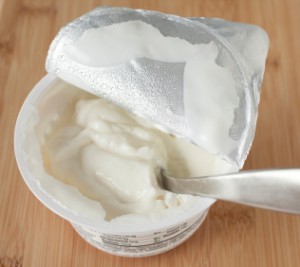 It is recommended that we should eat dairy products such as milk, cheese and yoghurt as part of a healthy diet. Because these foods are high in protein and calcium, moderate consumption of low-fat dairy products is thought to be important for growth, repair and strong bones.
It is recommended that we should eat dairy products such as milk, cheese and yoghurt as part of a healthy diet. Because these foods are high in protein and calcium, moderate consumption of low-fat dairy products is thought to be important for growth, repair and strong bones.
However, some recent studies have suggested that eating dairy products might not be as good for us as previously thought. A study published last week suggested that drinking three or more glasses of milk a day may be linked to increased fracture risk, and a Swedish investigation found a lower incidence of lung, breast and ovarian cancer in those with lactose intolerance – people who avoid consuming dairy products – compared with their lactose-tolerant relatives and the general population.
 Evidence from a recent meta-analysis suggests that overall dairy product intake protects against the development of type 2 diabetes, but contrasting findings have been reported on the effect of saturated fat found in dairy products on diabetes risk. A high level of low-density lipoprotein (LDL) cholesterol in the diet is a risk factor for type 2 diabetes, but recent findings suggest that the specific type of saturated fatty acid – “odd chain” or “even chain” – may be important in determining risk.
Evidence from a recent meta-analysis suggests that overall dairy product intake protects against the development of type 2 diabetes, but contrasting findings have been reported on the effect of saturated fat found in dairy products on diabetes risk. A high level of low-density lipoprotein (LDL) cholesterol in the diet is a risk factor for type 2 diabetes, but recent findings suggest that the specific type of saturated fatty acid – “odd chain” or “even chain” – may be important in determining risk.
Can yogurt prevent diabetes?
The relationship between dairy products and type 2 diabetes is indeed complex, and in a study published today in BMC Medicine, Frank Hu and colleagues from Harvard School of Public Health addressed the question of which specific dairy products are linked to diabetes risk. The authors analyzed data from three large cohort studies, HPFS, NHS and NHS II, and carried out an updated meta-analysis. Overall, the authors found no association between total dairy consumption and type 2 diabetes risk. When dairy products were broken down into individual types – including milk, cheese, yogurt (plain and flavored), cream and ice cream – yogurt intake was consistently associated with lower risk of type 2 diabetes. The authors conclude that:
“We found that higher intake of yogurt is associated with a reduced risk of type 2 diabetes, whereas other dairy foods and consumption of total dairy did not show this association. The consistent findings for yogurt suggest that it can be incorporated into a healthy dietary pattern.”
These findings provide evidence that when consumed as part of a healthy diet, yogurt can help to reduce our risk of developing type 2 diabetes. The authors highlight that more research into the effect of individual dietary components on type 2 diabetes risk is required, and we look forward to the results of randomized controlled trials on the protective effects of yogurt in the future.
when consumed as part of a healthy diet, yogurt can help to reduce our risk of developing type 2 diabetes. The authors highlight that more research into the effect of individual dietary components on type 2 diabetes risk is required, and we look forward to the results of randomized controlled trials on the protective effects of yogurt in the future.
Yogurt or curds is very popular here in South India where diabetes type 2 is very high. But curds is invariably taken with lot of rice. I presume the protective effect of curds is thus lost.
I feel future trials in this area should include yogurt specificity. Many flavored yogurts have high sugar &/or fat content to improve flavor, hence enhancing their marketing potential.This factor would be important in T2D pathogenesis.
What about the whey protein in Ricotta cheese?
El yougurt será beneficioso por el contenido de lacteos o por el contenido de bacterias?
It is a good thing to ask whether dairy is something we should or should not be consuming. We are consuming milk as adults from another species – such as cows or sheep or goats which is two things only our species could think of doing that probably does not correlate with ones environment naturally
In order to make yogurt or cheese or butter or cream anything you need dairy and still have to milk an animal which isnt a human. I do eat dairy though I am not very keen on it I like some cheeses and I do like milk in some drinks though I can do without aswell. I also do not use butter except with marmite spread on hot toast
I still may rather drink milk or cream to margarine (a completely artificial food known to be bad for you although the difference between butter and different sorts of it and how its made is not always paramount. Though the proper people would in many ways correctly always swear by butter – there is never a complete andwer to everything. Some informed people say certain margarines are as good for you as butters high in salt and other additives. I also would probably have it rather to soy which also is another controversial food that is often GMO and estrogen producing. Some say its better fermented although how they do this and whether this is true is not actually known either as both raw and fermented soy have been consumed in places for a while and have the same effect on health more than one would think. I have also tried soy when it got in my fridge and it tastes like it already has sugar in it. One person put it in a tea and I thought they had sugar in the tea when I sipped it and actually they did not – it was soy. It said on the package unsweetened. Later I drank a small cup of it to try it and I had a sweet sensation on the tip of my tongue getting me to wonder what really is in it